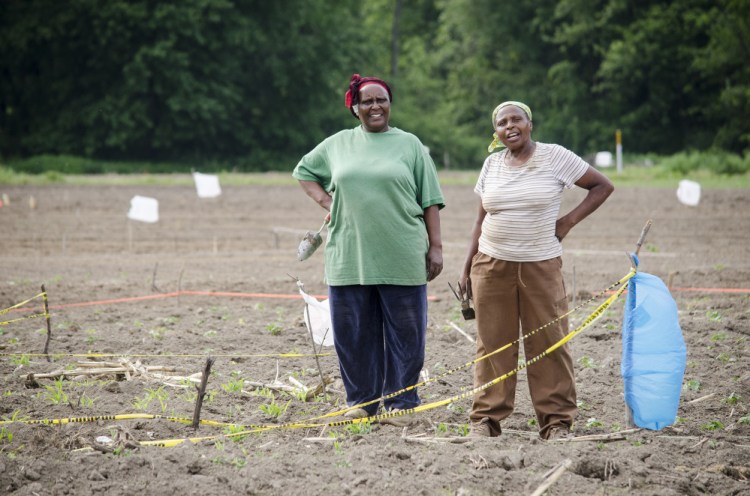LANCASTER, Mass. — Vue Yang cleared the weeds surrounding her crops planted in rows across her 1-acre plot, revealing small green leaves just beginning to emerge from the ground.
“It’s just like we used to do in my country, but a little different,” she said, wielding a hoe to remove the unwanted growth.
Yang, a Hmong resident of Fitchburg, has been farming daily at Flats Mentor Farm in Lancaster for seven years, a skill she learned in Laos, the country from which she emigrated in 1979.
Flats Mentor Farm, operated by World Farmers, provides more than 275 immigrants and refugees with land and knowledge to grow fresh crops.
Yang is among more than 15 Hmong residents who use part of the 70 acres at the border of Lancaster and Bolton, hidden behind a row of trees on Route 117.
Maria Moreira, executive director and co-founder of World Farmers, said the Hmong people occupy the largest plot of land and were the first group she provided space to when she opened the farm more than 30 years ago.
“I know what it’s like to not have land,” Moreira said about her motivation to turn what was once a field for her milking cows into a vast farmland shared by immigrants and refugees.
She emigrated to the United States from the Azores, where she came from a family of farmers.
“We want to connect people to fresh produce,” she said. “In this area, it’s easier to go to a fast-food chain than to access fresh crops.”
The connections go beyond the farmers markets with which many who use the land participate.
Because of a new three-year grant, the mentoring farm is welcoming local partnerships to provide assistance in crop development and marketing. Those partnerships include Nashoba Regional High School, UMass Extension, the Lancaster Agricultural Commission and Community Center and more.
Four interns from the high school will work with the farm during the summer to learn about nonprofit business, farming and other cultures, Program Director Jessy Gill said.
“It’s kind of like a cultural exchange,” she said.
“It’s a cultural experience you only understand through contact.”
And there are plenty of cultures at the farm, offering unique perspectives to farming and a diversity of produce.
The majority of the farmers are from Africa and share the remaining land which is divided into small plots.
Mary Koigi and her sisters from Kenya have been farming there for two years after finding out about the farm through word of mouth.
Koigi said she was enjoying kale at a friend’s house and asked where she got such fresh produce. Her friend replied she had farmed it in Lancaster.
“Now I have fresh corn, beans and tomatoes,” she said.
Most of the farmers have full-time jobs, but still make time to check on their crops both morning and night, and especially on the weekends, Moreira said. Koigi even called it an “extracurricular activity.”
Farmers pay a land preparation fee at the beginning of the season, Moreira said, but for first-year farmers the plot is free.
Farmers are able to decide the purpose for their land – consume the food they grow or, the most popular option, sell it.
The bulk of the produce grown is at farmers markets across the state.
“We sell at 40 different farmers markets,” Moreira said. “Each city and town want different produce.”
For instance, based on market research the farm has completed, lalu, a leafy green plant, is very popular in Brockton and Mattapan, she said.
“It’s difficult when you come to this country and you aren’t able to access foods that were once available to you,” she said. “It’s like a small piece of home.”
Copy the Story LinkSend questions/comments to the editors.



Success. Please wait for the page to reload. If the page does not reload within 5 seconds, please refresh the page.
Enter your email and password to access comments.
Hi, to comment on stories you must . This profile is in addition to your subscription and website login.
Already have a commenting profile? .
Invalid username/password.
Please check your email to confirm and complete your registration.
Only subscribers are eligible to post comments. Please subscribe or login first for digital access. Here’s why.
Use the form below to reset your password. When you've submitted your account email, we will send an email with a reset code.